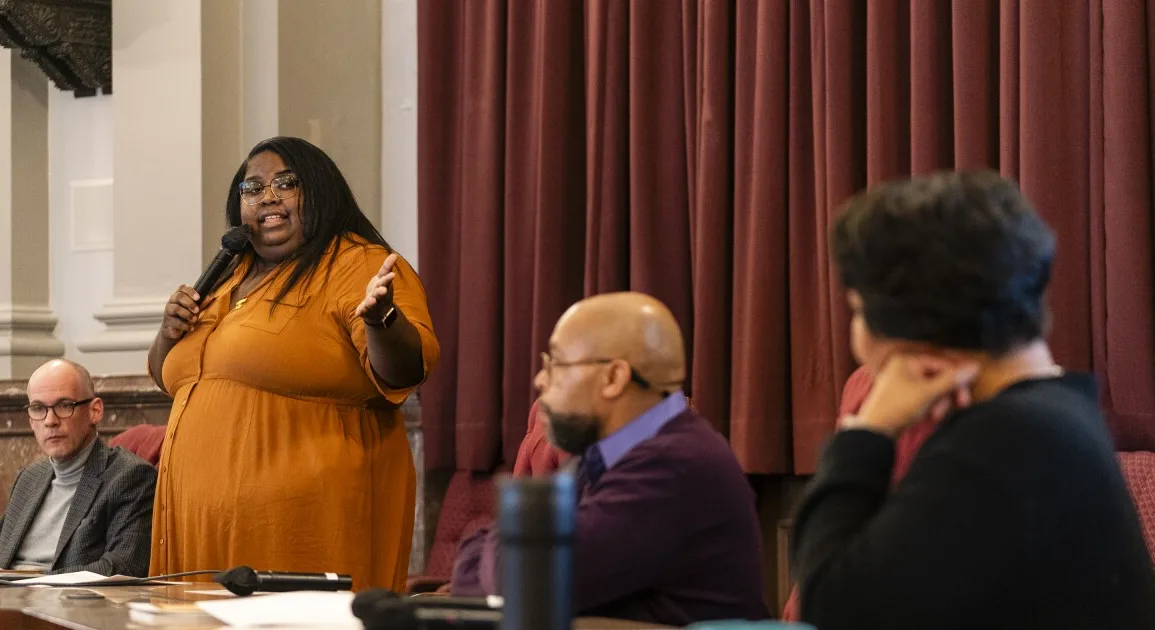The St. Louis Reparations Commission presented a proposed harm report to a crowd of about 40 people last week at St. Louis City Hall during its monthly meeting.
The approximately 100-page report will include an overview of reparations, the work of the commission, the history of slavery in St. Louis, a look at issues, recommendations and proposed next steps. The proposed issues for the report will likely include housing, neighborhood and built environment, education, public health, jobs and economy, and state violence.
Each section will include the St. Louis history of the issue, personal narratives, related recommendations and sources for further research.
“We’re trying to ensure the report gives a structural analysis and historical lens but also gives tangible human accounts for what, for what happened and the consequences of these policies,” said Kayla Reed, commission chair.
Reed prepared the proposed report. Members read harm reports from California; Evanston, Illinois, and other cities and states around the country that are studying reparations to influence their report. The commission will bring in issue experts, writers and researchers to write and produce the final report.
“We don’t really want to rewrite something that’s already been written,” Reed said. “We want to lean on that information to help shape the report.”
The eight-member group has outlined six issue areas that the community has expressed concerns with since the commission began holding monthly meetings last year. Each issue section of the reparations report would include history, the impact of the racism and specific examples with data points and maps to expand on personal narratives told during public testimonies and the history of racial discrimination in St. Louis.
About a dozen residents shared comments and thoughts on the presentation during the meeting. Malaika Horne said she is concerned about racist policies and practices in housing that are still on the books. She said racially restrictive covenants from decades ago that are recorded on deeds are still affecting Black St. Louisans. The Central West End resident hopes the commission includes the harms in detail. Horne would like her reparations in cash payments.
“We will have the checks, hopefully in cash,” Horne said. “But at the same time, we’re still confronted with a lot of the problems that are continuing to follow and drain our cash back out.”
St. Louis’ long history of racism is deeply entrenched in the society and goes beyond six issues, and the commission wants to identify them and fill in the gaps within every issue section, said Reed.
“We want to be reflective of the issues that are impacting people and communities,” she said. “But these decisions are really weighty because we identify six, and there’s 50 others that aren’t included in that.”
The commission is still workshopping the report. Members need feedback and more testimonies about racial discrimination and how it is manifesting in the lives of Black St. Louisans today.
St. Louis Mayor Tishaura Jones recently extended the commission until September. The commission requested the extension to continue hearing from the community and to have time to prepare the report. Members also asked Jones to provide a budget to produce the final report and recommendations. Reed said they are still communicating with Jones about funding.
A draft of the report will be presented to the public in a few months. People will be able to provide feedback on it. The commission will make final edits and submit the report to Jones in September.
“It takes money to do most things because of capitalism,” Reed said. “So, we felt to produce a report and to ensure that report reaches people to collect the stories of the public that we’ve been hearing in testimony, to provide that history, and what the Executive Order 75 mandates, we would need resources.”


